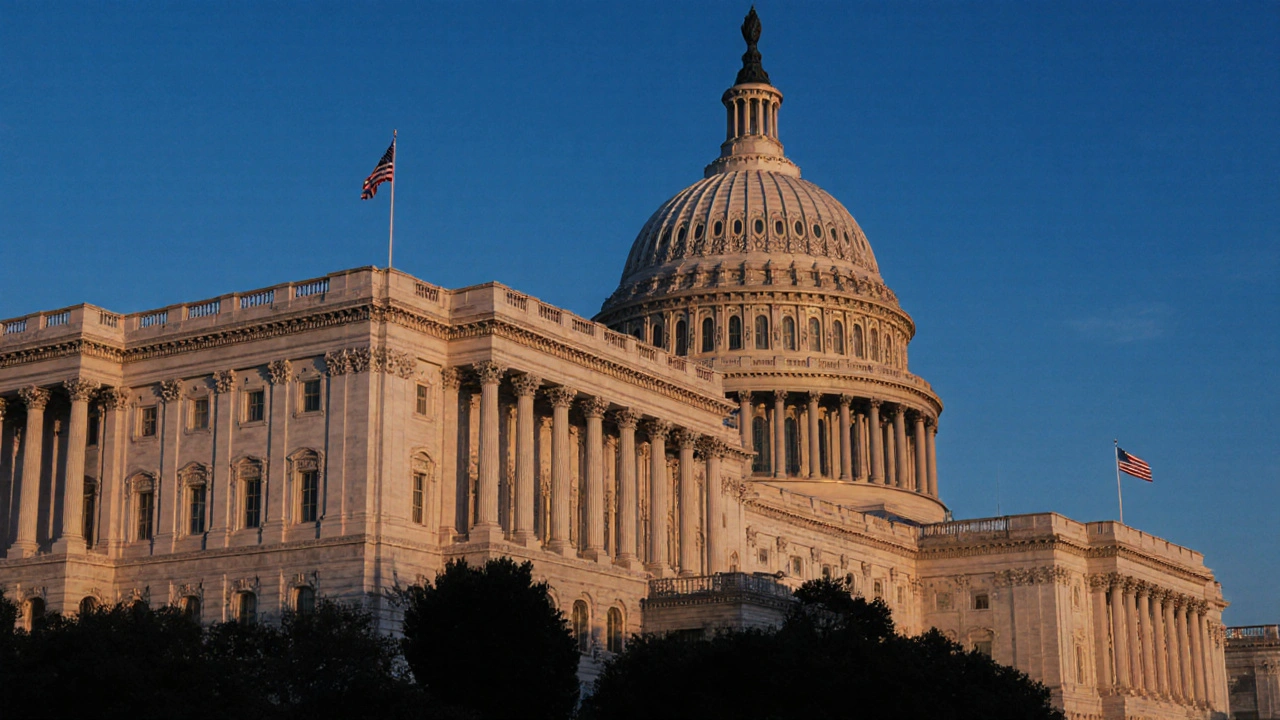Historic Victory in Arizona’s Border District
On September 23, 2025, Adelita Grijalva clinched a decisive win in a special election that will see her fill the seat once held by her late father, Raúl Grijalva, in Arizona’s 7th Congressional District. The district stretches from Yuma up through Tucson, hugging almost the entire Arizona‑Mexico border, and is home to a largely Hispanic electorate that has leaned Democratic for decades.
Grijalva’s victory is more than a familial succession; it marks the first time a Latina will represent Arizona in the U.S. House of Representatives. In an emotional acceptance speech she told supporters, “Together, we broke the glass ceiling.” She credited not only her family’s legacy but also her own record on the Pima County Board of Supervisors, insisting that voters chose her for her experience and platform.
Her Republican opponent, Daniel Butierez, is a contractor who runs a painting business and made his second bid for the seat after an unsuccessful 2024 run. While he centered his campaign on heightened border security and tackling homelessness, analysts say his message struggled to resonate in a district where Democratic registration outnumbers Republican registration by roughly two to one.

Implications for the House and Policy Priorities
The election nudges the balance of power in the 119th Congress to 214 Democrats against 219 Republicans. That five‑seat gap tightens the margin for House Speaker Mike Johnson, who now has a razor‑thin margin: losing just two GOP votes on any legislation opposed by all Democrats could doom a bill.
Grijalva entered the race with a policy agenda that mirrors her father’s progressive stance but adds her own emphases. She called for comprehensive immigration reform that would limit enforcement actions in schools, hospitals, and churches, a stance that appeals to the district’s immigrant communities. Water rights and climate resilience topped her environmental priorities, reflecting growing concerns over drought in the Southwest.
Economic development also featured prominently. Grijalva pledged to support small‑business owners through tax incentives and access to capital, aiming to revitalize towns that have seen job losses in recent years. On health care, she advocated for expanding Medicaid and bolstering community clinics, arguing that the region’s rural pockets still lack adequate medical services.
Perhaps most notably, Grijalva affirmed her commitment to tribal sovereignty, promising to work closely with the Tohono O'odham Nation and other Native groups on issues ranging from land protection to federal funding for tribal health programs.
The campaign’s grassroots momentum was evident in the primaries. Grijalva captured over 60% of the Democratic primary vote, besting a former state legislator and a Gen‑Z digital strategist who tried to position themselves as fresh faces. Butierez mirrored that margin in the Republican primary, suggesting both parties rallied behind clear frontrunners rather than a crowded field.
Turnout for the special election hovered around 38% of registered voters, a figure that falls in line with typical participation rates for off‑cycle contests. While modest, the turnout was enough to signal that Democrats remain energized in a district that has voted Democratic in virtually every election since Arizona achieved statehood in 1912.
Grijalva will serve the remainder of her father’s term—roughly 15 months—before the next general election determines the full‑term representative. Her short tenure still offers a window to shape legislation on immigration, climate, and tribal issues, and to establish herself ahead of the 2026 race.
Beyond the district, her win sends a symbolic message about representation in a state that has historically struggled to elect women of color at the federal level. Political analysts see her ascent as part of a broader trend where Latino voters are increasingly demanding leaders who reflect their community’s demographic makeup.
With the GOP’s margin narrowed, House leadership will be forced to negotiate more carefully on contentious bills, especially those involving border security and environmental policy—areas where Grijalva’s voice will now be part of the conversation.


Comments
Ira Indeikina
The election of Adelita Grijalva is not just a political footnote, it is a seismic shift in the narrative of representation. When a Latina steps into the halls of Congress from a district that straddles the very edge of the nation, the symbolism reverberates far beyond Arizona. History teaches us that every barrier broken expands the horizon of possibility for those who follow. The Grijalva family's legacy, while rooted in public service, now gains a new dimension through Adelita's own convictions. She brings to the table a lived experience that cannot be reduced to statistics or campaign slogans. Voters in the 7th District chose her not merely because of her surname but because of the concrete record she built on the Pima County Board of Supervisors. Her platform on immigration reform, water rights, and tribal sovereignty speaks to the daily realities of her constituents. In a nation where policy often feels distant, her presence serves as a reminder that governance can be intimate. Moreover, the narrow margin in the House amplifies the importance of each new voice, making her vote potentially decisive. The delicate balance of power will now have to accommodate perspectives that were previously underrepresented. This is not a token gesture; it is a functional augmentation of democratic input. As the Congress debates border security, climate policy, and health care, her insights from a border district will shape the conversation. The ripple effect may also inspire other states to elect more women of color to federal offices. The symbolism of breaking the glass ceiling is powerful, yet it must be accompanied by tangible legislative action. Adelita's challenge will be to translate that symbolism into policies that improve lives. In doing so, she will cement her place not only in Arizona's history but in the broader story of American inclusion.
September 26, 2025 at 02:37
Shashikiran R
It is absolutely shameful that anyone would even consider that this election was a fluke, its a betrayal of democratic values. The Grijalva dynasty should have been ending, not being turned into a political circus. People who cheer for legacy politics are defiantly ignoring the real issues that hurt the border communities. If you think this is progress you are definatly misinformed. The whole narrative is a distraction from the corruption that still runs deep.
October 1, 2025 at 21:31
SURAJ ASHISH
Another victory for the political elite, yet the media pretends it's a grassroots miracle. The candidate rides a wave of tokenism while the real problems stay ignored. It's as if the electorate only cares about a headline rather than substance.
October 7, 2025 at 16:24
PARVINDER DHILLON
Congratulations on this milestone! 😊 It feels like a breath of fresh air for the community, and I’m genuinely happy for everyone involved. 🙌 The representation matters, and I hope it leads to real change for the people along the border.
October 13, 2025 at 11:17
Nilanjan Banerjee
The curtain has risen on a new act in Arizona's political theatre, and Adelita Grijalva steps onto the stage with a presence that commands attention. Her ascent is not merely a footnote; it is a thunderous proclamation that the era of exclusion is finally yielding to the chorus of marginalized voices. With a dramatic flair befitting a heroine, she carries the hopes of a constituency that has long been silenced by stone walls and distant policymakers. The waters of the Southwest, the health of tribal nations, and the dreams of immigrant families now have an advocate whose very name resonates with resilience. May this drama evolve into a saga of substantive legislation.
October 19, 2025 at 06:11
sri surahno
One must ask who truly benefits from this so‑called historic win. The narrative of progress is often a veneer that hides a deeper agenda orchestrated by shadowy interests. It is evident that the establishment wanted to placate the Latino vote while maintaining the underlying power structures. The timing of the election, the selective media coverage, and the silence on certain policy betrayals all point to a calculated maneuver. We should remain vigilant and scrutinize every promise made under the guise of inclusion.
October 25, 2025 at 01:04
Varun Kumar
This is a win for America. We need strong borders and true representation.
October 30, 2025 at 18:57
Madhu Murthi
Finally someone who will put America first! 🇺🇸 We cannot let foreign influences dictate our policies any longer. 🚀
November 5, 2025 at 13:51
Amrinder Kahlon
Oh great, another “historic” moment, just what the country needed.
November 11, 2025 at 08:44
Abhay patil
Let’s keep the momentum going we have a chance to shape real policy together we must stay engaged and push for the reforms that matter we can’t afford complacency the future is in our hands
November 17, 2025 at 03:37
Amber Brewer
Adelita Grijalva’s victory brings an opportunity to address critical issues like water scarcity and healthcare access in the border region. With her background on the Pima County Board, she understands the local challenges and can work with federal agencies to bring resources where they’re needed most. It’s important for community members to stay informed and reach out to her office with concerns so that policies reflect the lived experiences of residents.
November 22, 2025 at 22:31
Kim Coulter
The election of a Latina congresswoman can be interpreted as a strategic affirmation of national identity in a multicultural tapestry. While the borders define our sovereignty, they also demand compassion for those who share our land. Adelita Grijalvo’s platform merges patriotic duty with progressive reforms, illustrating that one can love their country and still champion inclusive policies. This synthesis is the philosophical foundation for a stronger United States.
November 28, 2025 at 17:24
Michelle Toale-Burke
Honestly, it feels like the world is finally noticing the struggles we’ve endured for so long :(. This moment is a tearful reminder that hope can still surface in the darkest times :).
December 4, 2025 at 12:17
Amy Paradise
Wow, what an inspiring win! 🎉 I’m thrilled to see more representation and can’t wait to see the positive changes that follow. Let’s keep the conversation going and celebrate each step forward! 😊
December 10, 2025 at 07:11
Janette Cybulski
Hey everyone, just wanted to say it’s really uplifting to see someone from the community make it to Congress. It gives me optimism that our voices are finally being heard. Keep supporting each other and stay hopeful – we’re in this together.
December 16, 2025 at 02:04
Mildred Alonzo
While the election data appears transpaerent the underlying processes might still hold some obscure variables. It would be wise to examine the funding sources and voter outreach methods for any irregularities.
December 21, 2025 at 20:57
Elizabeth Bennett
Adelita Grijalva’s ascent to the House symbolizes both a milestone for representation and a practical platform for addressing pressing regional concerns. Her focus on immigration reform, water management, and tribal partnerships aligns with the needs of her district while contributing to national dialogues. As we observe her legislative initiatives, it is essential to assess how effectively she can navigate partisan dynamics to deliver tangible outcomes for her constituents.
December 27, 2025 at 15:51